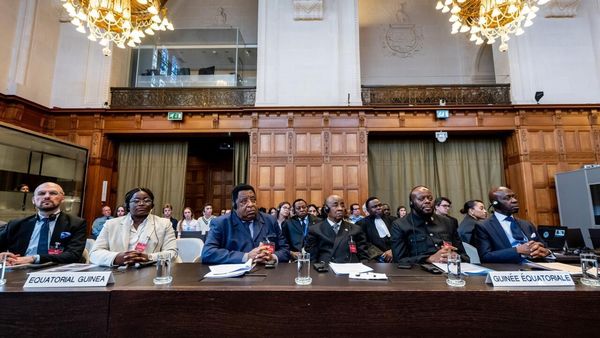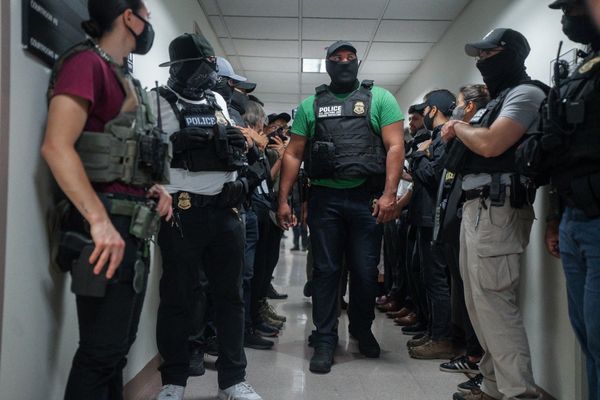A 28-year-old man will tomorrow stand in the dock of Auckland's biggest courtroom.
The public gallery will without doubt be packed again, while dozens of journalists will also fill the rows of press benches.
They will all be there to witness what sentence Justice Simon Moore delivers for the man who murdered Grace Millane.
His defence team and the Crown's prosecutors will make their arguments about what the killer should receive.
Eventually though, Justice Moore, who presided over last November's trial, will deliver his judgment.
/arc-anglerfish-syd-prod-nzme.s3.amazonaws.com/public/KT6T5EYM4NDDTDF2UQTN24BYMU.jpg)
READ MORE:
• Grace Millane's killer to be sentenced in Auckland but why won't he be named?
• Grace Millane murder trial: Jury returns guilty verdict and brings justice to backpacker's family
• Several legal reasons Grace Millane's killer continues to have name suppression
• Grace Millane murder trial: 5 key questions the jury had to answer
• Grace Millane murder: Top defence lawyer says 'we're not victim shaming', sex evidence was relevant
The man, who still cannot be named for legal reasons, has already became part of New Zealand's criminal history.
Since the British backpacker's murder in December 2018, there has been a flurry of public debate and intensity surrounding the court proceedings in New Zealand and around the world.
Below the Herald looks back at the cases of some of this country's most notorious murderers and what sentences they received.
William Bell
/arc-anglerfish-syd-prod-nzme.s3.amazonaws.com/public/NN2KOYB6ZFA3HMOFXG24L42I4Y.jpg)
William Bell became one of the most notorious murderers in New Zealand history when fatally gunned down three people and wounded a fourth during a robbery at an Auckland RSA in December 2001.
Bell was sentenced to life imprisonment with a minimum non-parole period of 33 years initially.
But on appeal the non-parole period was reduced to 30 years.
He was also sentenced to 13 years' imprisonment for attempted murder and a concurrent 12 years for aggravated robbery.
Bruce Howse
/arc-anglerfish-syd-prod-nzme.s3.amazonaws.com/public/ACESS63I4FGEXHFS22YG6XF4YE.jpg)
Bruce Howse murdered his stepdaughters Saliel Aplin and Olympia Jetson in their Masterton sleepout on December 4, 2001.
He was sentenced to life in prison with a non-parole period of 28 years.
Justice Lowell Goddard said she unequivocally accepted Howse was molesting the girls, which proved to be Howse's motive for the killings.
Paul Russell Wilson
/arc-anglerfish-syd-prod-nzme.s3.amazonaws.com/public/LAXS3C4FJBGTJB22U2CNHLJVTA.jpg)
A double-killer, Wilson was been sentenced to life imprisonment with a minimum non-parole period of 28 years for the rape and murder of Christchurch woman Nicole Marie Tuxford.
Wilson had murdered the 27-year-old after he lay in wait for eight hours overnight before Tuxford arrived back at her Merivale home in April 2018.
It also came after Wilson, who was a groomsman at David Bain's wedding, murdered his ex-girlfriend Kimberly Schroder in a chillingly similar case 24 years prior in Hokitika.
Also known as Paul Pounamu Tainui, Wilson will be at least 83 before he can even be considered for parole.
Russell Tully
/arc-anglerfish-syd-prod-nzme.s3.amazonaws.com/public/FNZZ6HGVPJCWLBBSZ4GVQRIFHQ.jpg)
The masked killer was jailed for life with an minimum period of imprisonment of 27 years after storming an Ashburton Work and Income on September 1, 2014.
Tully was found guilty in 2016 of being the gunman who shot dead receptionist Peggy Noble, 67, from point-blank range and shot case manager Susan Leigh Cleveland, 55, three times as she pleaded for her life.
Tully was also found guilty of attempting to murder case manager Kim Adams. He was found not guilty of attempting to murder case manager Lindy Curtis who was shot in the leg and badly injured while hiding under a desk.
He is appealing his conviction and sentence, with a hearing set for later this year.
Graeme Burton
/arc-anglerfish-syd-prod-nzme.s3.amazonaws.com/public/AIO2JWFGUBF4LD76F6FDUKJLYI.jpg)
In 2007 Graeme Burton, on parole for the murder of Paul Anderson, shot and killed Karl Kuchenbecker and wounded seven others in a drug-fuelled rampage in Wainuiomata and Wellington.
He was jailed for life with a minimum non-parole period of 26 years for the murder, and the attempted murder of two others.
Burton, who has a prosthetic leg after losing it in a police shooting, was also sentenced to preventive detention.
He has recently been the victim of a stabbing in Auckland Prison at Paremoremo, leaving him partially blind.
Tony Robertson
/arc-anglerfish-syd-prod-nzme.s3.amazonaws.com/public/7ZJ47PAO5ZBJPAI3EUXJKHZNIA.jpg)
In August 2015, Robertson was jailed for life with a minimum non-parole period of 24 years for the rape and murder of North Shore woman Blessie Gotingco.
Robertson hit Gotingco, 56, with his car before he took her to his home, where she was raped and then stabbed in 2014.
Last year he had his Supreme Court bid turned away in another failed attempt to quash his convictions.
Jason Somerville
/arc-anglerfish-syd-prod-nzme.s3.amazonaws.com/public/EFCDAJX3PFBW3DQKU3PTDLVG7Q.jpg)
The man who murdered his neighbour and his wife before burying them under his Christchurch home was sentenced in 2010 to life in prison with a minimum non-parole period of 23 years.
The case became known as the "house of horrors" murders and one of the most infamous crimes in modern New Zealand history.
It first came to light when Somerville called police to report his wife Rebecca Chamberlain missing.
Days later he confessed to murdering her because she rejected his sexual advances.
As Somerville spoke to police, he revealed there was another woman beneath his floorboards, his missing neighbour Tisha Lowry.
Malcolm Rewa
/arc-anglerfish-syd-prod-nzme.s3.amazonaws.com/public/CM63JY765VBBLB43GGJWAOKS3E.jpg)
Rewa was last year convicted and sentenced to life imprisonment for the murder of Susan Burdett in 1992.
The case - which has spanned 27 years, and saw innocent man Teina Pora locked away for two decades - eventually saw Rewa unanimously found guilty of the infamous murder.
Rewa's life sentence will be served concurrently with his existing punishment, a 22 year preventive detention sentence for his serial rapes.
He has appealed his murder conviction and sentence.
Mark Lundy
/arc-anglerfish-syd-prod-nzme.s3.amazonaws.com/public/DE3SQBQTRBFMHKBQWQEAKFQQFU.jpg)
Mark Lundy was sentenced to life imprisonment with a 20-year non-parole period for the murders of his wife and daughter.
Christine Lundy, 38, and her daughter Amber, 7, were killed in their Palmerston North home in August 2000.
A jury found Mark Lundy guilty of both murders.
In 2015 Lundy was granted a retrial but the jury, which deliberated for 16 hours over more than two days, returned unanimous guilty verdicts for both murders.
Justice Simon France immediately and reimposed the original sentence for Lundy.
Lundy's subsequent appeals have failed.
Antonie Dixon
/arc-anglerfish-syd-prod-nzme.s3.amazonaws.com/public/KJJNN7MXXVF65I3ETZI2NQLNBQ.jpg)
Dixon was given a life sentence with a non-parole term of 20 years.
He murdered James Te Aute in Auckland and attacked Simonne Butler and Renee Gunbie with a Samurai sword at Pipiroa near Thames in January 2003.
His first convictions were quashed in 2007 by the Court of Appeal, but the following year he was found guilty again at a retrial.
He died in prison in 2009, the day before he was to be resentenced.
Clayton Weatherston
/arc-anglerfish-syd-prod-nzme.s3.amazonaws.com/public/Z4PRH5KY7RFZTKM7KNUQD2C4LI.jpg)
Clayton Weatherston was sentenced to 18 years without parole for the murder of his former girlfriend Sophie Elliott in her Dunedin home.
He fatally stabbed and cut Elliott 216 times in her bedroom in 2008.
During his trial he blamed his unique psychological make-up for his losing control as Elliott taunted and then attacked him with a pair of scissors.
The case resulted in a law change, preventing the use of provocation as a defence.
Scott Watson
/arc-anglerfish-syd-prod-nzme.s3.amazonaws.com/public/5HUI2CNUK5BHNMJGC24CX24O4E.jpg)
Watson is serving a life sentence for the 1998 murders of Ben Smart, 21, and Olivia Hope, 17, in the Marlborough Sounds.
Their bodies were never found and the case has generated furious public debate ever since.
Watson was sentenced to a term of 17 years without the possibility of parole, which was declined in 2016.
He will be eligible for parole again on December 6 this year.
Watson maintains he never killed nor even met the pair.







